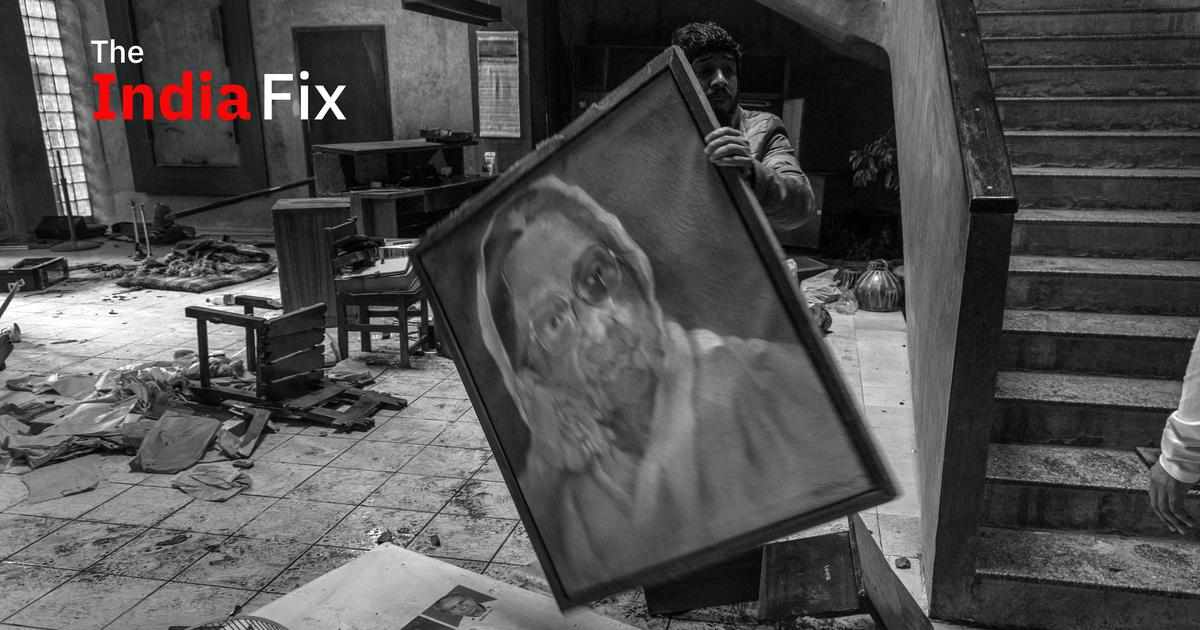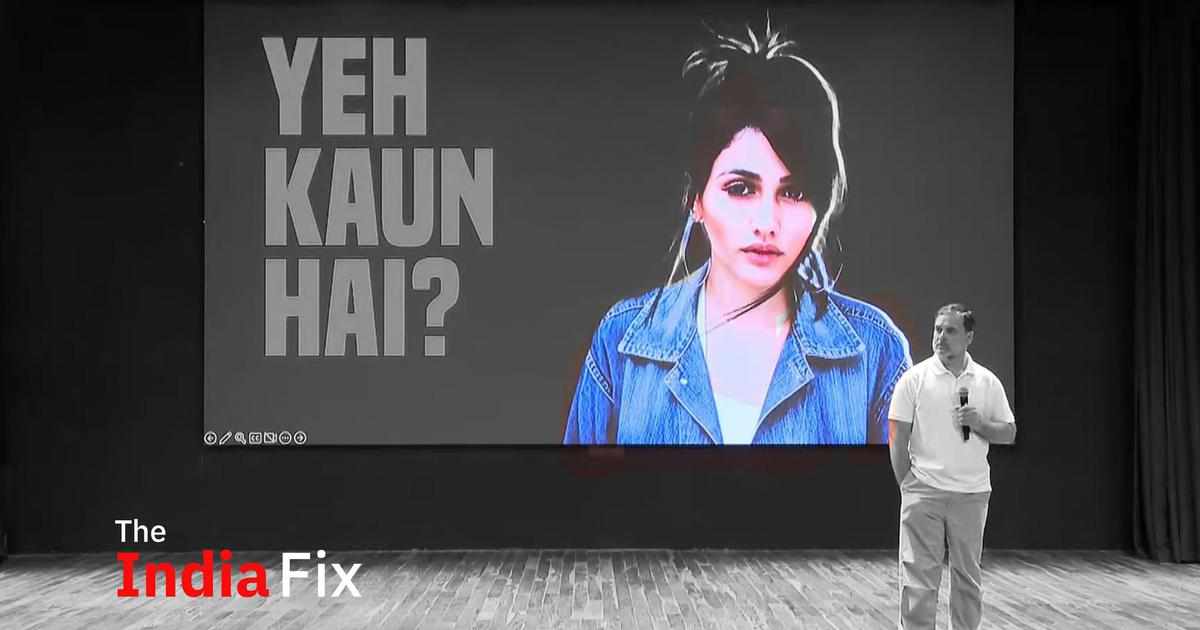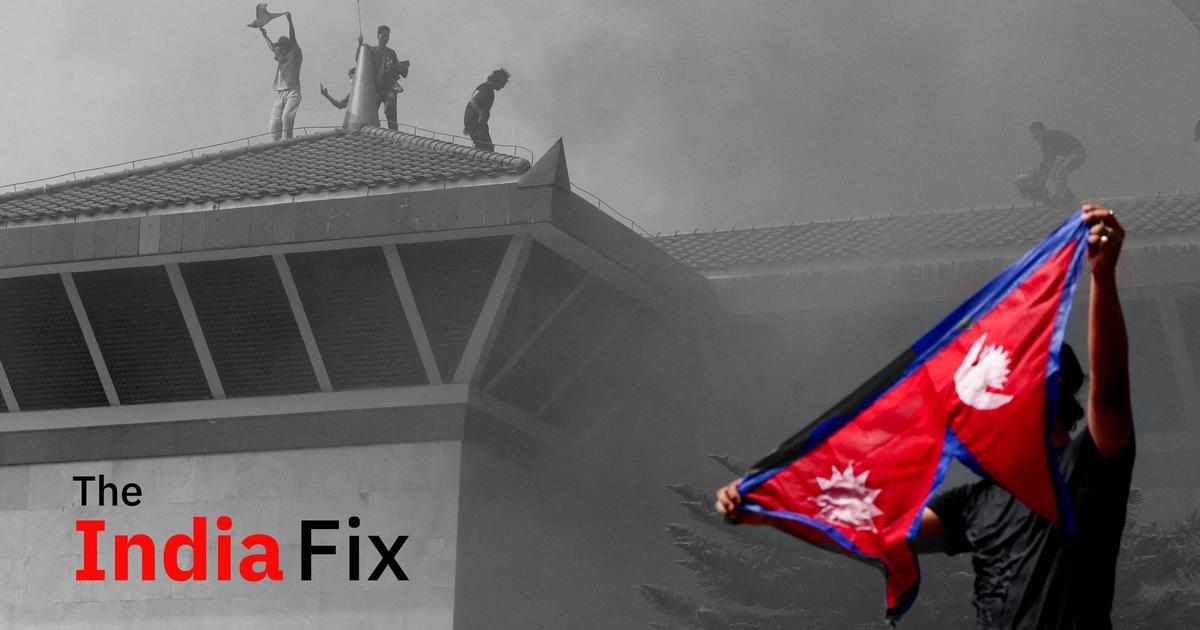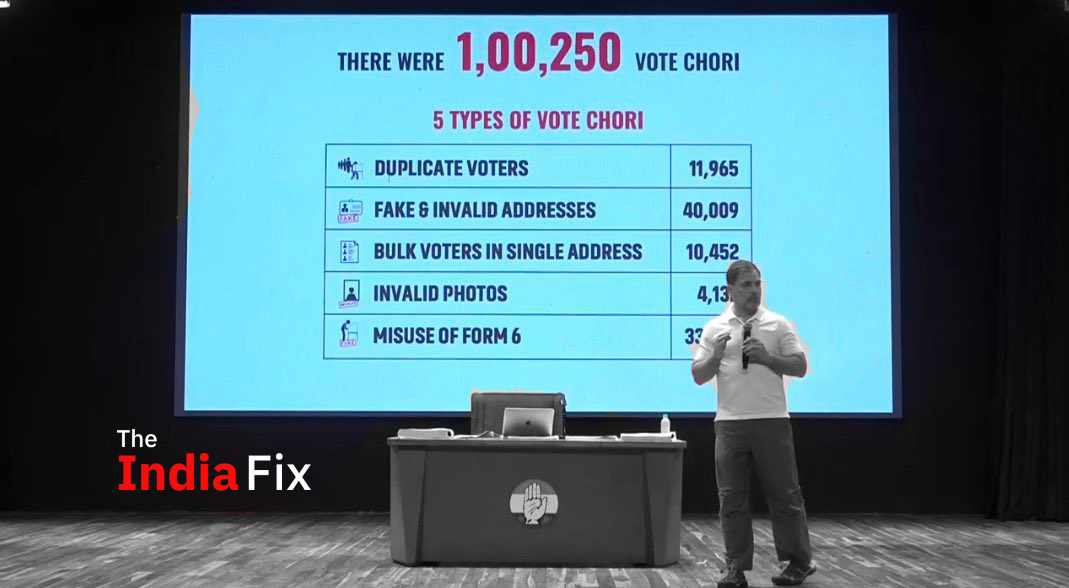
Apologies to The India Fix readers for being AWOL. But I'm back with a deeply reported story on the rise of Hindutva in Britain. Though most British Hindus don't subscribe to the ideology, it seems to have successfully presented itself as the voice of the community.
Unfortunately, there will still be no regular India Fix for the next two months. But watch out for surprises!
As always, if you’ve been sent this newsletter and like it, to get it in your inbox every week, sign up here (click on “follow”).
- Shoaib Daniyal
“If you want the Hindu vote, it’s not cheap,” Shital Manga said with a determined smile. “For the first time, [British] Hindus have put out a manifesto.”
She added: “The Hindu vote is not for free.”
Manga was speaking to Scroll in a chai shop in Leicester – the first city in the UK to have a non-White majority. Dominated by South Asians, most of them Gujaratis, Leicester had seen communal disturbances in 2022 following an India-Pakistan cricket match. There were brawls and hostile gangs marching through neighbourhoods as well as an attack on a temple.
The incident had shaken up the United Kingdom. While violence based on race was a familiar part of its recent history, the UK was unused to what residents of the subcontinent would instantly recognise as a Hindu-Muslim riot.
Manga belonged to InsightUK, a shadowy, yet belligerent Hindutva organisation in the UK. In the run-up to Thursday’s UK election, Insight had co-authored a “Hindu manifesto” urging British MP candidates to sign on to a charter of demands in order to attract Hindu voters. It also organised a “Hindu husting” in several constituencies across the UK, which featured debates between MP candidates on themes that matter to the Hindu community.
However, Insight’s role has not been restricted to electioneering. In Leicester, for example, it had played a key role presenting a Hindutva view on the violence, with its narratives being amplified by the controversial Indian Hindutva website, OpIndia.
The Hindutva ideology as promoted by India’s ruling Bharatiya Janata Party is not new to the UK. But people such as Manga and organisations such as InsightUK have taken it to new heights, openly pushing Hindutva into Britian’s politics with a new confidence.
The influence of these Hindutva organisations has allowed them to lobby politicians for policies that fit their ideology, from moving motions against “Hinduphobia” in British society to blocking national anti-caste legislation. This success is all the more remarkable given the small population of British Hindus, with only 1.6% of the UK identifying with the faith.
The Hindu Manifesto
The Hindu manifesto, presented by a total of 66 community organisations, has a set of demands that prospective British MPs were urged to endorse. The programme has had some success: 24 candidates backed it. Some of the demands are banal, related to immigration of priests and healthcare for British Hindus.
However, it also wades into more controversial topics. The manifesto claims £117 million has been “provided to UK Muslims for protective security funding” and asks for a similar allocation for the “security and protection of temples”. As part of this, the manifesto highlights the 2022 Leicester riots in which a temple was attacked.
Most contentiously, the manifesto calls for recognising “anti-Hindu hate as a religious hate crime”.
For British Hindus who do not see eye to eye with Hindutva, this manifesto is controversial. “I am so sad and angry to see it,” said Rajiv Sinha, director of an organisation called Hindus for Human Rights UK. “While a lot of it sounds perfectly nice and polite, it is a way for Hindutva organisations in the UK to package their agenda.”
Sinha takes particular objection to the manifesto’s demand for a law against anti-Hindu hate or Hinduphobia. “This label of Hinduphobia that they are promoting. it is a way to stifle dissent and specially to stifle criticism” of Indian Prime Minister Narendra Modi, his Bharatiya Janata Party and its parent organisation, the Rashtriya Swayamsevak Sangh, he contended. “Hinduphobia is a propaganda project.”
Many academics agreed with Sinha. “Hinduphobia is a recent, made-up term,” said Mukulika Banerjee, professor of anthropology at the London School of Economics. “That there is systematic discrimination against Hindus in the UK on the basis of their faith is simply not true.”
Subir Sinha, Director of the South Asia institute at the School of Oriental and African Studies in London, argued that claims of Hinduphobia was also a way to ward off discussions on caste, especially in light of attempts to pass an anti-caste discrimination law in the UK.
Rajiv Sinha pointed to the ideological leanings of some of the organisations behind the manifesto, among them the Hindu Swayamsevak Sangh. In his book Hindu Nationalism in the Indian Diaspora, academic Edward Anderson describes the Hindu Swayamsevak Sangh as the “overseas wing” of the Rashtriya Swayamsevak Sangh, the principal Hindutva organisation in India and the parent of the ruling BJP.
In 2002, the Channel 4 television station reported that the Hindu Swayamsevak Sangh had strong links with a British charity called Sewa International, which, it alleged, was sending funds raised in the UK to Hindutva organisations in India.
On the ground, the Hindu manifesto has significant support in areas with concentrations of Hindus. Rita Patel, a former member of the Leicester city council and a popular community leader, for example, contextualises it as part of a long tradition of politics by non-White minorities in the UK.
“We don’t see anything wrong in it [the manifesto],” she said. “This is faith communities making their voices heard on what they see are important priorities the next government needs to address. I don’t have any issues, in fact I’d encourage as many people to do it.”
A long history
The first branch of the Hindu Swayamsevak Sangh was set up in 1966. “Much of the initial impetus for Hindu nationalism in the UK at the time was provided by migrants from East Africa,” Anderson said.
In his book, Anderson recounts the 1975 Emergency and the Ram temple movement in the early 1990s as major inflexion points for the growth of Hindu identity politics among the diaspora. By the end of the 1990s, British politicians began engaging with Hindutva groups. For instance, the Labour MP Barry Gardiner “cultivated an especially close and active relationship with not just the HSS and VHP in the UK, but also the BJP and its affiliates in India”, writes Anderson.
A couple of decades later, far right Hindutva leaders such as Tapan Ghosh and Sadhavi Ritambara from India were invited to the British Parliament by Bob Blackman, of the Conservative party.

This Hindutva influence has shifted in the past decade from individual MPs in Britain to national politics at the party level. In 2019, for instance, the Overseas Friends of the BJP organisation campaigned for the Conservatives.
Amardeep Bassey, a UK journalist who covered the 2022 Liecester riots, sees this as a concerted effort to create a Hindu voting bloc along the lines of how British politicians already court Muslims and Sikhs. “You [political parties] keep chasing Muslim and Sikh votes,” Bassey said, describing how many Hindu activists feel. “What about us? We also have the power.”
In Britain, Muslims were the first to become politicised in the wake of anger against Salman Rushdie for so-called blasphemy in 1988 with and the War on Terror launched by the United States against Islamist terror groups, Sunny Hundal, a journalist who has written extensively on Hindutva in the UK told Scroll. British Sikhs followed, he said.
“After the rise of Modi [in 2014], the UK also saw a sharp rise in Hindu identity politics helped along by the fact that Labour under Corbyn leaned towards Muslims,” Hundal said.
Rita Patel reiterated the sentiment that British Hindus feel ignored compared to other religious groups. “Because we are law abiding, because we are easy going, because we don’t make a song and dance about all the issues, it’s easy for people to ignore our needs,” she said. “There are sections of the Hindu community who do feel forgotten.”
This sense of victimhood is unusual, explains Gurharpal Singh, a political scientist who grew up in Leicester and taught at the School of Oriental and African Studies in London. “Hindus are by and large a well-off community, they are professionals, well-educated.” he said. “Clearly they are well represented in public life. The issue then becomes one of a contrast vis a vis other communities.”
The churn within Britain’s Hindu community is significant enough to be seen in national-level data. While traditionally, South Asians have voted Labour, a Carnegie study published in 2021 found that a plurality of Hindus now support the Conservative Party even as the majority of Sikhs and Muslims lean towards Labour.
Gurharpal Singh, however, cautions from reading this shift to the Conservatives as one entirely due to Hindutva. “Hindus are increasingly professionalised,” he points out. “So this is not just ideology but also a move driven by class driven by factors such as lower taxation.”
Singh’s point can also be seen in the Carnegie data. Though the perception British Indians have of Indian Prime Minister Narendra Modi is modulated by religion, more British Hindus disapprove of him than approve.

Hindutva capture
Anderson argues that this diversity of opinion should not be a surprise. “All South Asian communities in Britain, including Hindus, have a rich history of progressive politics,” he said. “While there is a definite Hindutva influence on some British Hindus, this hardly captured the entire landscape.”
Rajiv Sinha is even more blunt. “I am sick of all [UK] Hindus being represented as Hindutva,” he said angrily. “The media landscape and politicians need to do a better job of picking up progressive Hindu voices.”
Sinha’s frustration is understandable. In spite of the ideological diversity within British Hindus, it is clear that Hindutva organisations have largely been able to successfully represent themselves as the sole spokespersons of the community to policy makers.
Subir Sinha, Director South Asia institute at the School of Oriental and African Studies in London, attributes this to a combination of the failure of British multiculturalism as well as austerity designed to reduce government deficits.
Multiculturism as a policy in the UK means designing laws and norms recognising the fact that immigration has made Britian a diverse society. This includes, among other measures, funding for ethnic and faith-based organisations.
“Since Blair [who was prime minister from 1997 to 2007], the government has equated religion and culture,” Sinha said. This rise in importance of religious insitutions got a further boost after austerity hit from 2010 onwards and many social integration programmes got scrapped, leading to mosques and temples stepping in to provide social services that the state once supplied, Sinha explained.
Controlling policy
The biggest evidence of the power of Hindutva in the UK is that it successfully stymied a law against caste discrimination about a decade ago. “Even though a National Institute of Economic and Social Research study found evidence of caste discrimination in the UK, Hindutva organisations mobilised so vociferous against an anti-caste law that it was watered down and eventually shelved,” said Chetan Bhatt, a professor in Sociology at the London School of Economics who has worked on far-right extremism.
A similar trend can now be seen on the issue of Hinduphobia. While Anderson points out that the term was rarely used even till five years ago, during this election campaign, the issue is now so mainstream the leader of the Labour Party Keir Starmer mentioned it during this election campaign by saying it had “no place” in the UK.
This change has occurred through intense work by Hindutva organisations. “In 2018, Bob Blackman said at a meeting organised by the Hindu Forum of Britain that there was a need to learn how a new definition of antisemitism, regarded as controversial since it is seen as a means of silencing criticism of Israel, was adopted by institutions in Britain in order to do something similar for Hinduphobia,” Amrit Wilson, a UK writer and activist on issues of race and gender told Scroll.
The rise of Hindutva has also led to a climate of fear for many British academics and journalists who study the ideology. One journalist Scroll spoke to declined to be quoted on record since it would put “OpIndia onto me”. Another academic said they might be guilty of “self censorship” due to fear of attacks from Hindutva activists and even reprisals from the BJP-controlled government by denying them the right to travel to India.
Ground control
The sharpest example of Hindutva’s success can be seen on the ground in Leicester, in the charged post-riot environment. Insight has publicly criticised a SOAS inquiry into the Leicester violence that is still underway. When Scroll visited Leicester it found that Insight was working on the ground, with some success, to persuade Hindus to boycott the inquiry.
“When I was covering the disturbances, I was surprised how deep hatred was,” Bassey recounted. “They [Muslims] are dirty, we don’t want them here – these were the things the gora said to us when we came to the country.”
Scroll contacted InsightUK’s Mitesh Sevani in London but he declined to speak.
MPs running for office in Leicester back Hindutva issues without qualms, presuming that without it they will not get the city’s substantial Hindu Gujarati vote. A few days before the vote, Scroll met Keith Vaz, the Aden-born, Goan-origin politician who served as Leicester East’s MP for 32 years as a member of the Labour Party. This time, he ran as a member of the small One Leicester party. During the interview, Vaz endorsed the Hindu manifesto, praised Modi, supported Hinduphobia legislation and opposed any anti-caste measures. “He [Modi] is not a figure of divisiveness for me,” Vaz said.
Even this, however, is not enough for Hindutva organisations in Leicester. Speaking to Scroll, Insight’s Shital Manga said that Hindus should not vote for Vaz since he expressed support for Palestine. Instead, she supported the Conservative candidate, Shivani Raja. On Friday, Raja won the Leicester East seat, one of the party’s few bright spots as it got voted out of power.

India impact
While Hindutva supporters in the UK look to India for inspiration, they also, in turn, strengthen the ideology back home. InsightUK, for example, was a significant source for OpIndia’s coverage of Leicester. Fake news from India was identified by the BBC as one cause of the violence even as the city’s mayor blamed Hindutva as being a “part of it”.
Though the Hindu manifesto makes it a point to claim that that its connection to India is only “spiritual and not political”, Hindutva organisations in the UK are deeply invested in Indian politics. Insight for example has criticised the 2020-’21 protests by Punjabi farmers, attacked Mamata Banerjee’s government in West Bengal, called a 2024 Tamil movie “anti-Hindu and backed the Modi’s government’s removal of Kashmir’s special status.
This link is so strong that it involves the direct involvement of the British diaspora in Indian Hindutva politics. The most prominent example of this is Manoj Ladwa. A member of the Hindu Swayamsevak Sangh, Ladwa, according to Anderson’s book, “served as Communications Director for Prime Minister Narendra Modi’s 2014 election campaign and helped to organise the momentous, post-election Madison Square Garden and Wembley Stadium events in New York and London”.






















Write a comment ...